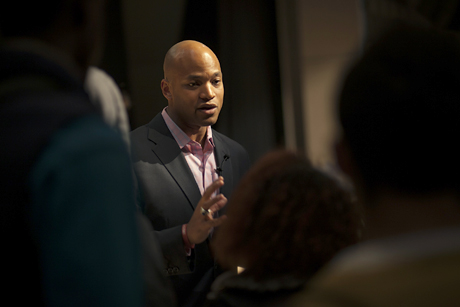MLK speaker: Leadership and education save lives
By Natalie O'Toole

Imagine two boys with identical names, both being raised by poor single mothers and living just blocks away from each other. One becomes a best-selling author, Rhodes scholar, U.S. Army officer, White House fellow and TV host, while the other receives life in jail without parole for the murder of a police officer. It may sound like a fictitious tale, but it is the story of two Baltimore men named Wes Moore.
The scholar Wes Moore delivered the annual Martin Luther King Jr. Commemorative Lecture Feb. 11 at Sage Chapel. He spoke about his novel, "The Other Wes Moore," and how truths King preached are relevant today in providing equal opportunity to all children.
"The most persistent question that Dr. King forced this country to ask itself ... is what are we doing to make sure that we are living in a society that is fair? That everybody - no matter who you were born to, no matter where you were born - has an opportunity to succeed...," Moore said.
He noted that the felon Wes Moore's mother was unable to finish college due to grant cuts, and he posed the question: How different would her son's life had been if she had gotten a college degree and left the inner city?
"When you happen to raise kids or nurture children in some of the most precarious communities of our country, it's that much more complicated," Moore said. "But there are some things that fundamentally matter and, ironically, they're all shades and echoes of Dr. King still seeing over our shoulders. Because one of them is education."
Moore emphasized that the connections one makes at college can set a person's life on the right track. "And the beauty of education," he added, "is that ... no one can ever take [it] away from you."
Moore argued that the "people who taught me that the world was bigger than what was directly in front of me" are essential to disadvantaged youths: "Every one of us knows what it's like to be standing there and have people in your lives who are holding up your dreams at least long enough for your shoulders to be broad enough that you can then carry them yourselves. All of us."
After a decade of corresponding with the incarcerated Moore, the scholar Moore asked him if he believed they were products of their environments. "'Actually, I think we're products of our expectations,'" said the jailed Moore.
This led Moore to conclude that expectations are a major factor in life decisions.
"Someone once said to me, 'It's a real shame that you lived up to your expectations and Wes didn't.' And I said, 'Actually, the real shame is that we both did.'"
A final point Moore made was that children respond to organized responsibility but easily can be swept up into gang life this way. Moore was able to find meaning through his leadership at military school, but he noted that many do not.
"Drug organization[s] ... are carbon copies of every single military organization and every single Fortune 500 company," he said. "You can become a muscle, or a housemate or a lieutenant or whatever. But it's the same graduated sense of responsibility ... I had a purpose. We had a purpose."
Moore concluded: "Leadership matters because, fact is, these kids are going to get it. So the question is: Where are they going to get it from?"
The King lecture is sponsored by Cornell United Religious Work.
Natalie O'Toole '16 is a writer intern for the Cornell Chronicle.
Media Contact
Get Cornell news delivered right to your inbox.
Subscribe